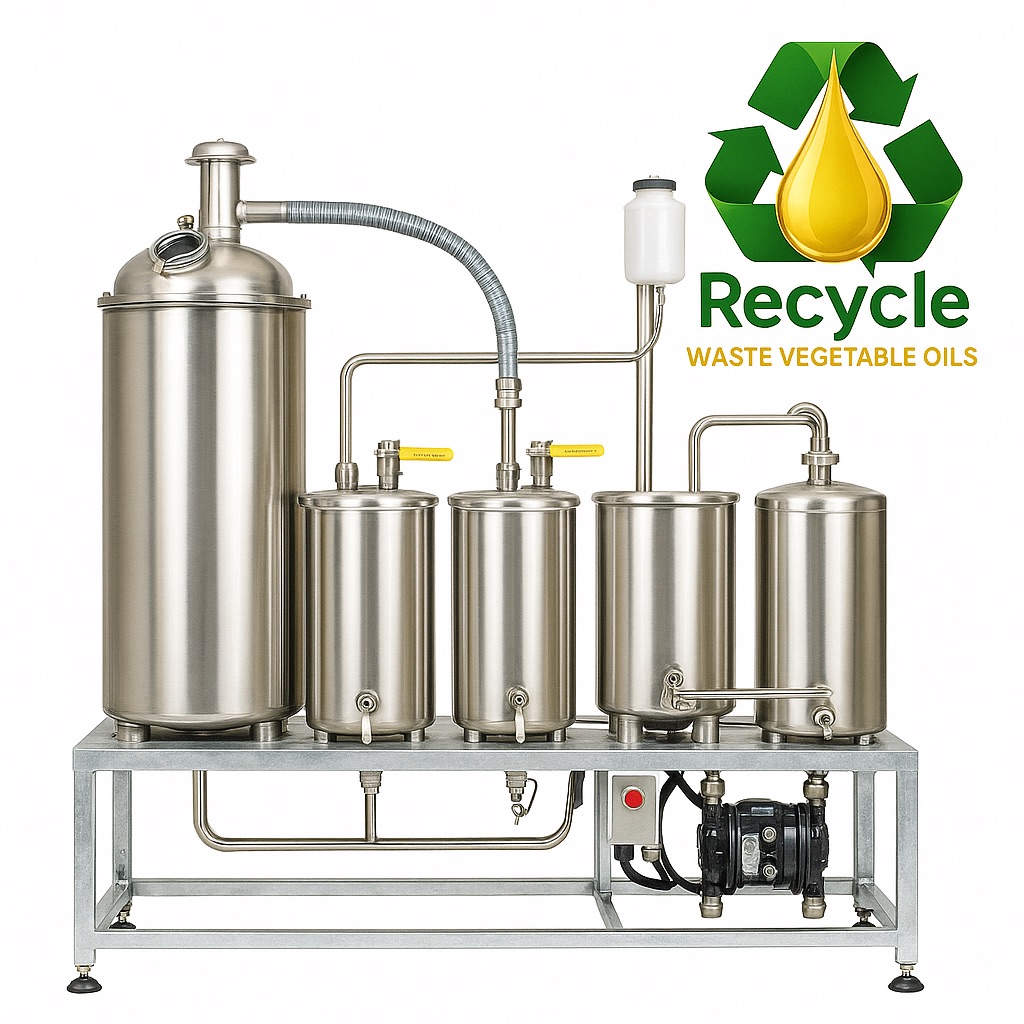Home / About / Services / Contact / North Yorkshire / East Riding Yorkshire / South Yorkshire / West Yorkshire / Greater Manchester / Derbyshire / Reference / FAQ

Biodiesel Processor
Every day, thousands of litres of used vegetable oil are discarded by commercial kitchens, restaurants, takeaways, and food processing facilities. Rather than allowing this waste to pollute drains or end up in landfills, our collection service ensures it is recycled and transformed into clean energy sources that help power the future via a Biodiesel Processor.
Collection of Waste Vegetable Oil
Our process begins at the source. We provide safe, compliant, and reliable collection services for businesses generating used cooking oil. Clients are supplied with secure containers that are regularly emptied and replaced to ensure cleanliness and safety. Each pickup is logged and documented to meet all local environmental and waste management regulations.
Transport to Licensed Processing Facilities
Once collected, the waste vegetable oil is carefully transported to licensed processing facilities. These facilities operate under strict environmental controls and are audited to ensure they meet industry standards for safety and sustainability. During transportation, oil is handled in sealed, leak-proof containers to eliminate the risk of spills or contamination.
Initial Filtration and Cleaning
At the processing facility, the used oil undergoes a thorough filtration and cleaning process. This step removes food particles, water, and other impurities that could interfere with fuel conversion. The result is a cleaner feedstock, ready for conversion into renewable fuels.
The Conversion Process
After cleaning, the oil is processed through a chemical reaction known as transesterification. This method separates the glycerin from the fat or vegetable oil, producing two products: biodiesel and glycerol. Biodiesel is a clean-burning, renewable fuel that can power diesel engines with fewer emissions compared to traditional fossil fuels.
Some of the filtered oils are also refined into Hydrotreated Vegetable Oil (HVO), a premium biofuel that meets high-performance standards. HVO can be used in diesel engines without modification and produces significantly lower greenhouse gas emissions.
A portion of the collected oil is further developed into Sustainable Aviation Fuel (SAF), a breakthrough fuel alternative for the aviation industry. SAF can reduce carbon emissions by up to 80% compared to conventional jet fuel, making it a critical component of the global push toward greener air travel.
Environmental and Economic Benefits
Recycling waste vegetable oil has a wide range of benefits. It helps reduce landfill waste, lowers the risk of water pollution, and supports the circular economy. It also reduces reliance on non-renewable fossil fuels by offering a practical, scalable solution for clean energy generation.
Businesses that participate in our oil collection service not only stay compliant with waste regulations but also contribute to a more sustainable future. Whether it’s helping to fuel vehicles or power aircraft, your used oil plays a meaningful role in reducing global carbon emissions.
Why Choose Our Waste Oil Collection Service
- Fully licensed and compliant with UK environmental regulations
- Reliable scheduled collections and emergency pickups available
- Free supply of secure storage containers
- Detailed documentation for your waste disposal records
- Direct contribution to the production of renewable fuels
Get Started Today
If you're a restaurant, takeaway, catering business, or commercial food operation looking for a responsible way to dispose of your used cooking oil, we’re here to help. Our collection services are fast, compliant, and environmentally friendly.
Contact us today to schedule your first collection or to learn more about how your waste oil can make a difference in powering the future.
Last updated - 13/06/2025






